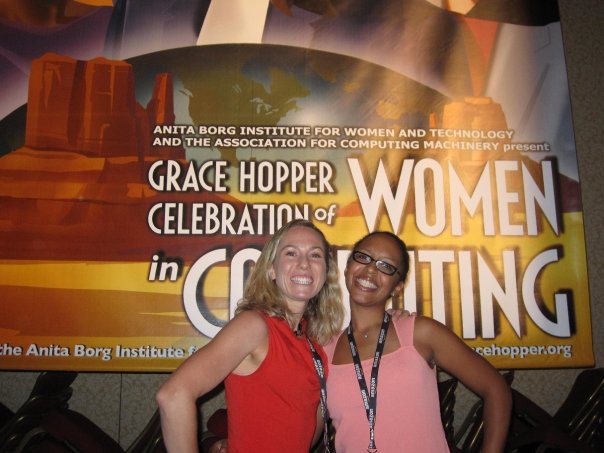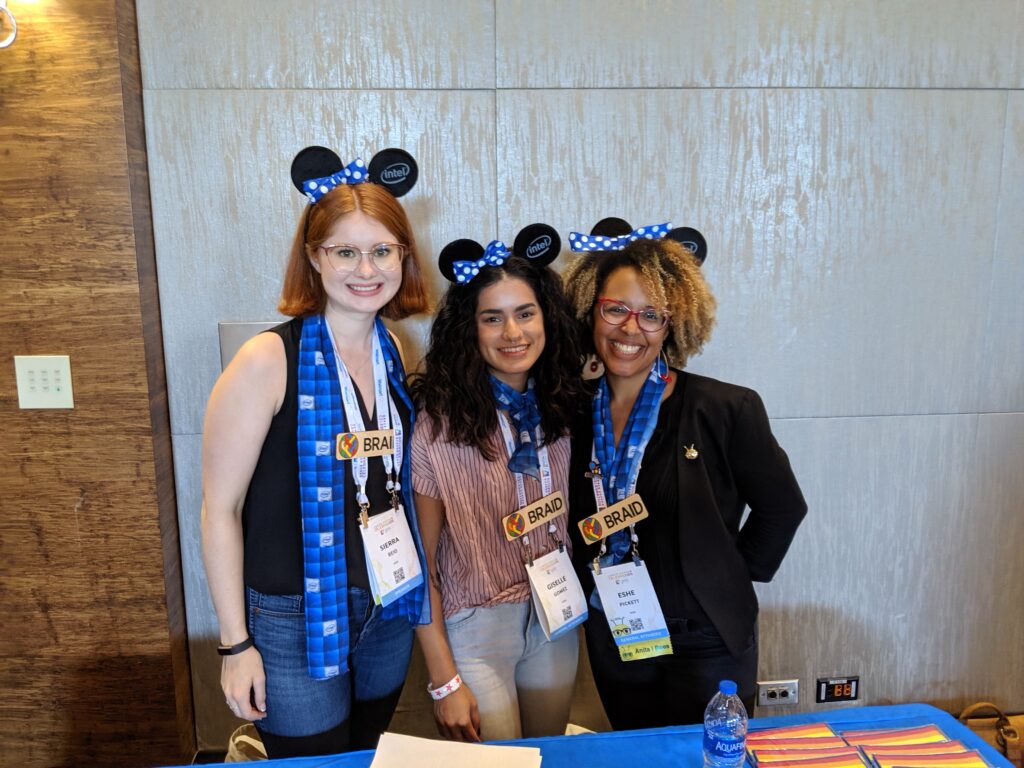There is a comprehensive run down of the opening keynotes for Grace Hopper 2019 available via the #GHC19 Daily Download. What follows are my personal reflections on the opening keynotes of this, my third Grace Hopper Conference.
I first attended GHC in 2009 in Tucson, AZ at a conference hall that would not accommodate a single large session today. My coworker and I volunteered as Hoppers helping to pack swag bags for the attendees, which we were able to complete with around 20 other women in the course of a couple of hours.

The difference between then and now is night and day. Long lines whose wait times rival those at Disney, sprawling session locations that will help you exceed your steps goal for the day three times over (my fitness tracker captured 22,135 steps), and 30 minute shuttle rides to and from the conference center. What has not changed is the awe, inspiration, and hope I feel walking into a room filled with women in technical roles. As I have progressed in my career, the number of rooms I find myself in where that is the case, has become fewer and further between.
The message communicated by every speaker this morning was that we must be advocates for one another, it is our responsibility to:
- Increase the visibility of other women
- Commit to help by getting involved
- Bring others with us
When all voices are not part of the conversation, the very technology we depend on to make the world a more open and inclusive place, can become rife with bias–through no fault or intention of the creators, a simple blind spot is enough. Though inadvertent, the end result is the same; solutions that are normalized on a standard that does not accurately represent the population.
The unique perspective that Ana Roca Castro brought to her career in technology, allowed her to contextualize her solutions for Genius Plaza through the lens of culturally relevant content. She inherently understood that we cannot aspire to be what we do not see. The history of colonization had removed many of the contributions made by the colonized people. By reincorporating their language and history, Ana helped young children and their parents to connect to what they thought did not include them; now, they could see themselves represented.
Dr. Natalya Bailey was told that in order to be more successful, she needed voice lessons to lower the register she spoke in to be taken seriously, change her leadership model to be more aggressive, and step aside as CEO. Fortunately, she opted not to follow that sage advice. She instead went on to raise over $25 Million in capital for Accion systems, using her high-pitched voice, and she is still CEO today. Natalya encouraged us to trust who we are, celebrate our differences, and own our strengths. By conforming to established norms, we would fall victim to the same blind spots that plague us today for fear of being seen as different — but we are there to speak for those not in the room; if not us, who?
Neural Net Innovator, Dr. Fei Fei Li was discouraged from pursuing her desire to create an image database that would serve as the foundation for machine learning in computer vision, she was told it could be career ending. She had never been made to feel so small. Three years later with the help of her graduate students, ImageNet, a database of 14 Million images (and growing), was born. Dr. Li told us that it is okay to feel small, in fact, feeling small compared to the vast Universe is what lead her to marvel at how the mind works and piqued interest in teaching machines to learn using images. What she also wanted us to know is that though we may feel small at times, together, we are big enough to accomplish anything.
Aicha Evans spoke mainly about her path to CEO at Zoox, but it was her opening quote that impacted me most:
“Nothing in life is to be feared, it is only to be understood. Now is the time to understand more, so that we may fear less.” – Marie Curie
Simply put: we fear what we do not understand. This made me think about the fear that comes with change. When we speak about making room at the table, that can make many feel afraid. There is a fear that bringing more voices to the conversation will drown out those already present; that inclusion for some, means exclusion for others — which couldn’t be further from the truth; exclusion excludes. Which brings me to the final speaker of the morning: Jhillika Kumar.
Jhillika’s unique perspective on inclusion came from the first hand experience of watching her autistic brother struggle to fully participate in life without the primary means to communicate that most of society uses; he had never spoken. In watching her brother interact with an iPad, Jhillika saw him come alive in ways he had never demonstrated, and she wondered — what would happen if we brought all of the unique perspectives of the roughly 14% of differently abled members of our society to tackle problems in technology? How many Temple Grandin’s might we be missing because we haven’t changed our thinking?
That point was driven home many years ago for me when attending a leadership program and a wheelchair bound man spoke about housing standards. He mentioned how counter heights, outlets, door widths, and many other items in a home that have to be retrofitted at great expense for someone in his condition, would have been easy to include in the standard for everyone with no impact to the majority — if his community had only been a part of the initial standards decision making process. It was eye opening. As cliched as it may sound, we are blind to what we cannot see.
I have heard it said that “I don’t see differences, I just see people,” but that is not accurate. As the speakers illustrated through their stories, we are all processing the many unique characteristics we see in people every day — in fact, we want to teach machines to do it. To the women (men, and non-binary) attendees of GHC, I want to say: I see your differences, and they are beautiful, they are valuable, they are important, so let’s bring them everywhere we go, and maybe together, we can change the world a little.
